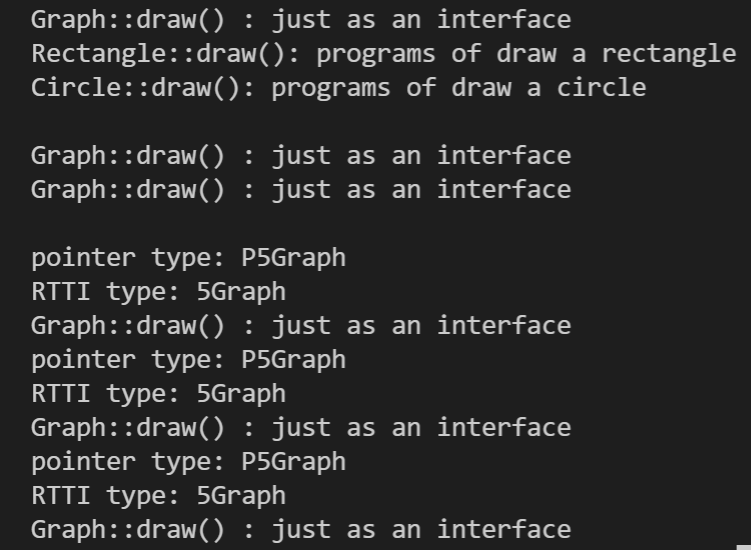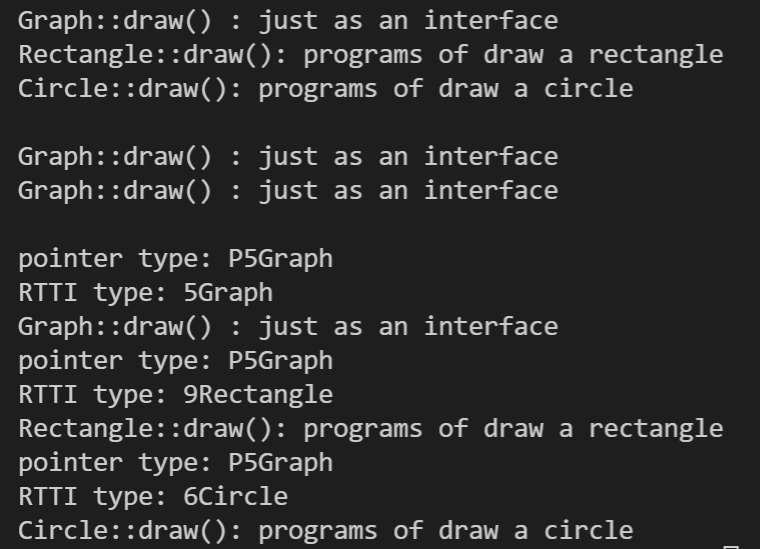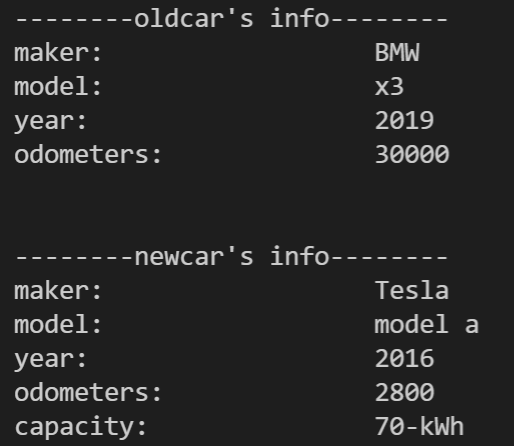实验4 继承
实验任务2
#include <iostream> #include <typeinfo> // definitation of Graph class Graph { public: void draw() { std::cout << "Graph::draw() : just as an interface\n"; } }; // definition of Rectangle, derived from Graph class Rectangle : public Graph { public: void draw() { std::cout << "Rectangle::draw(): programs of draw a rectangle\n"; } }; // definition of Circle, derived from Graph class Circle : public Graph { public: void draw() { std::cout << "Circle::draw(): programs of draw a circle\n"; } }; // definitaion of fun(): as a call interface void fun(Graph *ptr) { std::cout << "pointer type: " << typeid(ptr).name() << "\n"; std::cout << "RTTI type: " << typeid(*ptr).name() << "\n"; ptr -> draw(); } // test int main() { Graph g1; Rectangle r1; Circle c1; // call by object name g1.draw(); r1.draw(); c1.draw(); std::cout << "\n"; // call by object name, and using the scope resolution operator:: r1.Graph::draw(); c1.Graph::draw(); std::cout << "\n"; // call by pointer to Base class fun(&g1); fun(&r1); fun(&c1); }

归纳总结:
同名覆盖原则:派生类与基类中有相同成员/函数时,若未强行指名,则通过派生类对象访问的是派生类的同名成员/函数。
二元作用域分辨符:如果要通过派生类的对象访问基类被覆盖的同名成员/函数,需要使用 对象名.基类名::同名成员/函数 来限定。
类型兼容原则:派生类的对象可以被赋值给基类对象;派生类的对象可以初始化基类的引用;基类的对象指针可以指向派生类。
在基类Graph的成员函数draw()前面加一个关键字virtual,重新编译运行后的结果:

观察结果可知,通过在Graph类的接口draw(),不加/加关键字virtual,运行时ptr实际指向的对象不同。
当基类的函数为虚函数的时候,可以通过基类去访问子类的函数。
实验任务3
Battery.hpp
#ifndef BATTERY_HPP #define BATTERY_HPP class Battery{ public: Battery(double capacity0 = 70); double get_capacity() const; private: double capacity; }; Battery::Battery(double capacity0): capacity{capacity0} { } double Battery::get_capacity() const { return capacity; } #endif
Car.hpp
#ifndef CAR_HPP #define CAR_HPP #include<string> using namespace std; class Car{ public: Car(string maker0, string model0, int year0, double odometers0 = 0); void info() const; void update_odometers(double odo); private : string maker; string model; int year; double odometers; }; Car::Car(string maker0, string model0, int year0, double odometers0): maker{maker0}, model{model0}, year{year0}, odometers{odometers0} { } void Car::info() const { cout << "maker:\t\t\t" << maker << endl << "model:\t\t\t" << model << endl << "year:\t\t\t" << year << endl << "odometers:\t\t" << odometers << endl; } void Car::update_odometers(double odo) { if(odo < odometers){ cout << "更新后的行车里程数值小于当前行车里程数!!!更新数值有误" << endl; }else{ odometers = odo; } } #endif
ElectricCar.hpp
#ifndef ELECTRICCAR_HPP #define ELECTRICCAR_HPP #include "Battery.hpp" #include "Car.hpp" using namespace std; class ElectricCar : public Car { public: ElectricCar(string maker0, string model0, int year0, double odometers0 = 0, double capacity0 = 70); void info() const; private : Battery battery; }; ElectricCar::ElectricCar(string maker0, string model0, int year0, double odometers0, double capacity0): Car{maker0, model0, year0, odometers0}, battery{capacity0} { } void ElectricCar::info() const { Car::info(); cout << "capacity:\t\t" << battery.get_capacity() << "-kWh" << endl; } #endif
task3.cpp
#include <iostream> #include "electricCar.hpp" int main() { using namespace std; // test class of Car Car oldcar("BMW", "x3", 2019); cout << "--------oldcar's info--------" << endl; oldcar.update_odometers(30000); oldcar.info(); cout << endl; // test class of ElectricCar ElectricCar newcar("Tesla", "model a", 2016); newcar.update_odometers(2800); cout << "\n--------newcar's info--------\n"; newcar.info(); }
运行测试截图:

实验任务4
pets.hpp
#include<string> #include<iostream> using namespace std; class MachinePets{ public: MachinePets(const string s) : nickname{s} {} virtual string talk() { return ""; } string get_nickname() const { return nickname; } private: string nickname; }; class PetCats : public MachinePets { public: PetCats(const string s) : MachinePets{s} {} string talk() { return "miao wu~"; } }; class PetDogs : public MachinePets { public: PetDogs(const string s) : MachinePets{s} {} string talk() { return "wang wang~"; } };
task4.cpp
#include <iostream> #include "pets.hpp" void play(MachinePets *ptr) { std::cout << ptr->get_nickname() << " says " << ptr->talk() << std::endl; } int main() { PetCats cat("miku"); PetDogs dog("da huang"); play(&cat); play(&dog); }
运行测试截图



